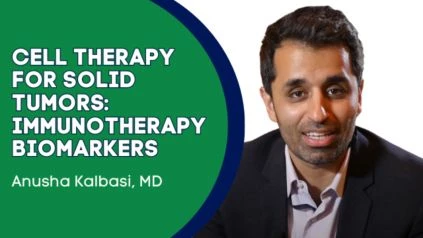By. Anusha Kalbasi, MD
Date. 11/22/2023
In a recent discussion on adoptive T cell therapies for solid tumors, Anusha Kalbasi, MD, provided a comprehensive analysis of various modalities, shedding light on their challenges and potential breakthroughs. Kalbasi began by delving into the realm of tilt therapy, a longstanding approach for melanoma patients. Over the last decade or two, industry interest has surged, revealing response rates of 30 to 50 percent in heavily pretreated melanoma patients. The comparison with immune checkpoint blockade, particularly ipilimumab, has demonstrated promising data on tilt therapy’s longer progression-free survival.
The conversation then shifted to TCR-engineered therapy, where Kalbasi elucidated on the exciting results observed in sarcoma patients, specifically those with synovial sarcoma expressing mage a four. The tangible progress in this field, highlighted by an FDA application, marks a significant step forward in TCR-based therapies, with the potential for expanding to other targets and HLA types.
Moving to CAR T cell therapy for central nervous system (CNS) tumors, Kalbasi, MD, acknowledged the historic success in hematologic cancers and emerging victories in solid tumors. Notably, CAR T cells targeting IL 13 receptor alpha 2 and GD2 showcased early success in glioblastoma and midline glioma, respectively, indicating a shift in the narrative for solid tumor treatments.
Addressing challenges and recent setbacks in TIL, TCR, and CAR therapies, Kalbasi, MD, underscored the shared hurdles of intense conditioning regimens, toxicities, and concerns about on-target effects. Despite these challenges, ongoing strategies in T cell engineering, patient selection, and optimization seek to enhance the therapeutic window for these cell therapies.
The discussion concluded with a glimpse into innovative approaches such as remote-controlled CAR T cells and logic-based CAR T cells. Kalbasi, MD, explained how these cutting-edge techniques leverage synthetic biology to modulate cell function post-administration, offering potential avenues to minimize toxicity and improve efficacy. The logical gating of antigen recognition further addresses the perennial challenge of identifying suitable tumor antigens in CAR T cell therapy, showcasing the evolving landscape of adoptive T cell therapies.

